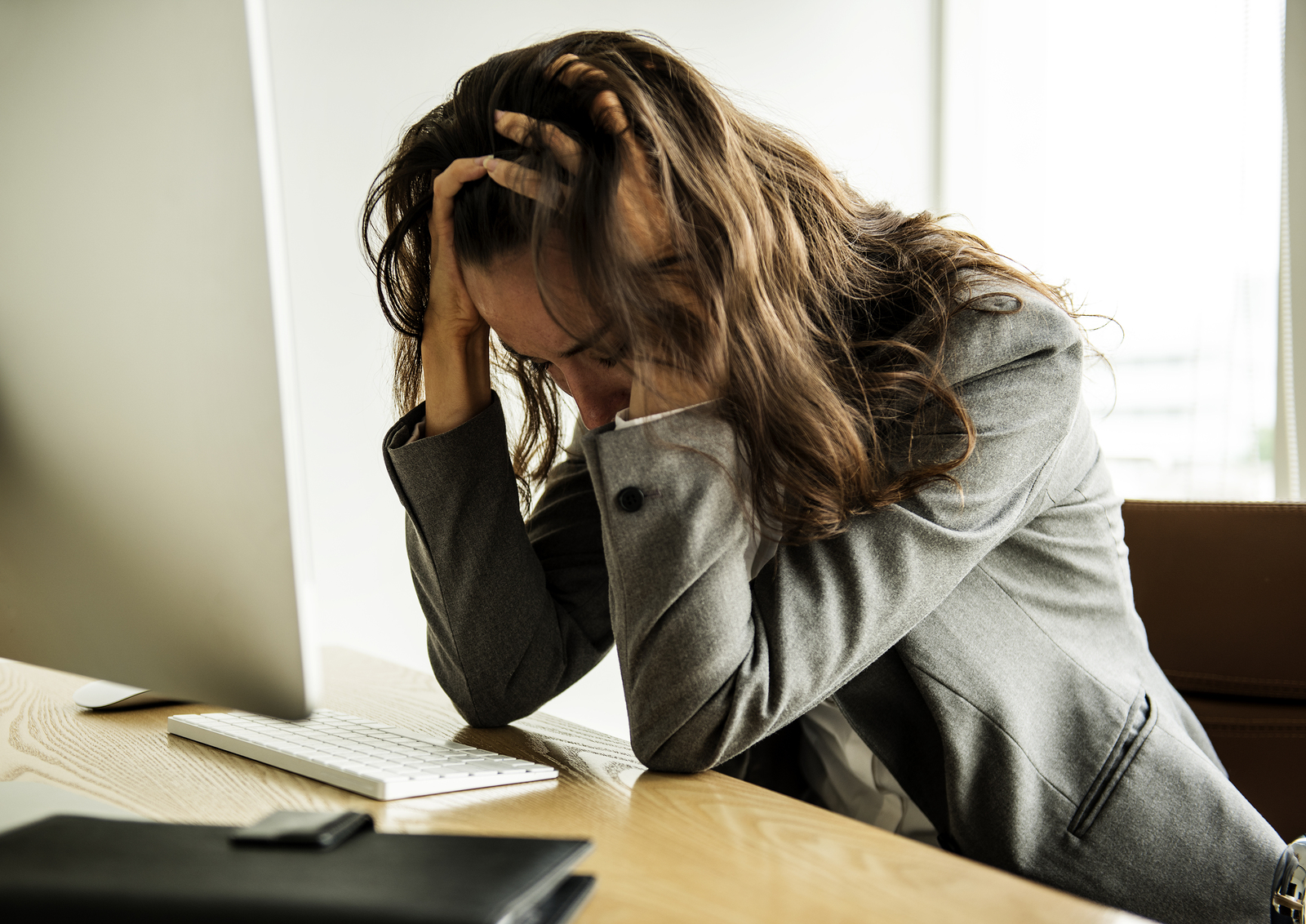Have you ever met anyone who says they never feel any kind of stress? If you have, take it from me, they’re not telling you the truth – though they might not even realize it! Stress is a fact of life. Your body is biologically designed to perceive stress and react to it. But those people who think they don’t ever feel stress? They’ve learned how to manage it well – and you can too!
Unfortunately, many people never do. In 2013, a study published in the Journal of the American Medical Association Internal Medicine stated that 60-80% of primary care visits may have a stress related component. But that same study showed that a very low percentage of these patients (3%) received stress management counseling from their primary care physician. This is such a missed opportunity!
Conventional medicine still hasn’t embraced a holistic view of health care, instead treating symptoms and disease in isolation. In my practice, my philosophy has always been that we need to look at all of the factors before settling on a course of action. When we look at the whole picture, we see that stress has a huge impact on health. That’s why stress management has long been a part of the conversation I have with patients.
Why Aren’t Doctors Talking More About Stress?
We know so much more than we used to about the impacts of stress on health. So why aren’t more conventional practitioners offering strategies for dealing with stress?
In that 2013 study, several explanations surfaced. First, it was discovered that stress counseling increased for patients managing chronic conditions, especially in those experiencing a flare-up of the condition. This suggests that physicians are reactive, rather than proactive, in their approach. It all ties back to looking at symptoms in isolation, rather than overall health and wellness.
Another possibility is that the role of stress in non-mental health related conditions is not well recognized. In all the conditions studied, counseling was only associated with depression. That may be because the link between depression and stress is well documented and understood by physicians, while the association with other conditions, despite lots more research becoming available, still is not.
Finally, there’s the time factor. Most conventional doctors are limited in the amount of time they can spend with a patient — sometimes, just a few minutes! There’s no good way to get a clear picture of what’s happening in someone’s life with that little time. Personal stress is exactly what it sounds like — unique to each individual. If you can’t talk to someone about their personal experience, how can you possibly offer solutions?
As you can see, responsibility for stress management often falls to the individual to figure out. That’s where I can help! We’ll take a look at what stress is, where it comes from, and then I’ll give you some quick tips on how to manage the stress in your life.
What is Stress?
Biologically speaking, stress is defined as any threat to homeostasis – the physiological balance needed for survival. Your body systems need a specific set of parameters for peak performance. You have a built in stress response system that works to keep these parameters balanced.
This system is critical to your good health and survival. Your nervous system prompts a physical response to stressors, often known as the “fight or flight” response. Specific hormones, including cortisol and adrenaline, are released, raising your heart rate and preparing your body for danger. This is a natural response, and like I said, you need it in some circumstances. You can not live without it. The problem emerges when your body, confused by a barrage of stressors, can’t distinguish between real and perceived danger. When these stress responses are activated too frequently, your body keeps releasing those hormones, keeping levels elevated. We know that high cortisol levels are associated with heart disease, insulin resistance, obesity, type 2 diabetes, Alzheimer’s disease and so many other serious health concerns. So determining what causes us personal stress, and finding ways to manage our reactions to these stressors, is vitally important.
What is a stressor? Anything that activates your stress response. Stressors come from all directions. They can be environmental, physiological, or emotional. And they aren’t the same for everyone — that’s why we hear so much about “personal stress!”
Have you ever heard a friend talking about a stressful situation, maybe a problem with a co-worker, and wondered “what’s the big deal?” That perfectly illustrates how personal stress can be. Our reactions are guided by so many factors – some unknown even to us. So what makes you want to tear your hair out might not phase your best friend at all. But one thing is for certain — whatever the source, stress impacts us all.
Stress in the US
Let’s take a quick detour to talk about some information released in the American Psychological Association’s 2017 report Stress in America: The State of Our Nation. Every year, the association conducts a survey on stress, and what they find may surprise you. For instance, a new common source of stress has emerged in 2017 with the inclusion of a question on additional stressors: the future of our nation.
Other common stressors, which likely come as no surprise, are money and work. The survey showed consistent stress levels compared to last year, but a rise in the reporting of symptoms related to stress, including anxiety, fatigue and anger. In fact, 75% of respondents said they had experienced at least one stress related symptom.
The report also revealed that women’s stress levels have increased slightly, while men reported a slight decrease. Older adults, while still showing lowest stress levels overall, reported a slight increase. Millenials had the highest levels of stress, and showed a slight increase as well.
But the report wasn’t all bad news. Over half of the respondents said that the state of the nation has caused them to take action – volunteering and supporting causes they value, or addressing issues of concern through petitions, boycotts or other direct action.
And there’s an increase in healthy coping mechanisms that Americans are employing to deal with stress too. Fifty-three percent said that they’ve used physical activity to cope, and 12 percent (up from 9 percent) are using yoga or meditation as a strategy. So even if doctors aren’t offering concrete stress management counseling, people are finding healthy ways to support their bodies and deal with personal stress.
In order to find the best strategies for you, it’s important to understand where your personal stress is coming from. Let’s take a look at some sources you may not have considered.
Personal Stress Could Be Related to These Surprising Factors
Insomnia, traffic jams, difficult relationships, parenting, work. It’s probably no surprise that those things can take a toll on your body. But have you ever considered the impact of the following factors?
- Food sensitivities can cause bloating, excess gas, fatigue, joint pain, diarrhea, and brain fog.
- Hormonal imbalance could make you feel irritable, tired, and also prompt cravings for carbohydrates, hot flashes, night sweats, and irregular periods, among many other symptoms.
- Lack of essential nutrients can cause symptoms like hair loss, fatigue, brittle hair and nails, leg cramps, and chocolate cravings.
- Exercising too much could make you feel totally wiped out after exercise, cause extreme fatigue, and cause you to miss menstrual periods.
- Not eating enough can bring on lightheadedness, dizziness, and extreme irritability.
As you can see, there are so many stressors that you might never have considered. And that’s just the tip of the iceberg. We also need to be aware of internal emotional stressors, and what we can do to address these.
Can I Really Change Emotional Stress?
While you might be able to recognize ways to change physical stress (ie, eat more often), it can be much trickier to identify and address emotional stress. You might think you’ve already dealt with that failing relationship, childhood trauma, death of a loved one, or messy job situation. But often, emotional stress lingers if you haven’t truly processed it, and that stress continues to call upon your adrenals for cortisol to keep you going.
Does that mean that stress will always be there? Not necessarily. Most of the time, you can heal emotional trauma, but it takes a lot of hard work and self-awareness. Several years ago, I wrote a blog called What You Think is What You Get. The information I shared then, based on a conversation with Louise Hay and Cheryl Richardson, may be even more relevant today. We cannot always change our circumstances, but we can change how we react to situations. Thoughts are powerful, and positive thinking along with daily affirmations can make a huge difference in your life.
Changing how you think isn’t easy, and you might need the help of a professional counselor. You can also try the Emotional Freedom Technique (either by learning about it online or working with an experienced practitioner), or a program like the Hoffman Quadrinity Process. Whatever strategy you choose, the most important thing is intentionally working to change negative patterns and diminish emotional stress.
Quick Tips for Relief from Personal Stress
Now that we’ve talked about all the different ways you can experience stress, it’s time for some concrete strategies for addressing it. I have many articles about stress in my health library that offer more in depth solutions, but here are some quick tips to keep in mind.
- Take inventory of your personal stressors. To really be sure you are identifying where your personal stress is coming from, write out a list. Ask yourself questions about the stressors I listed above – could they be impacting your body?
- Choose one thing to change. Trying to address all of your stressors at the same time sets you up to fail. Some women find it easiest to address physical stressors first, then move to the emotional stressors when they’re feeling a bit more relaxed and ready.
- Eat well and often. A healthy diet is the best solution for so many things — including stress reduction! Eating a variety of fresh whole foods, including healthy fats, and avoiding sugar and processed foods, can really change the way you react to other stress. This is especially important to do when you have added stress.
- Try exercise, yoga, or meditation. The key here is to find something you love. Forcing yourself to do something you don’t enjoy will only increase your stress.
- Just Breathe! Of course you’re always breathing – but when you make the time to stop and breathe deeply and intentionally, stress can melt away. Try the 7-7-7 technique – breathe in for a count of seven; hold for seven; exhale for seven. Do this a few times throughout the day – you’ll be amazed at how calm it can make you feel!
What Are You Waiting For? Start NOW!
There’s no time like the present to start managing your stress. If you wait too long, chronic high levels of cortisol could create total burnout, leaving you unable to even think about making a change. Adrenal fatigue can be a seriously debilitating problem, so don’t let your stress take you down that road!
For Personal Stress, You Need Personal Solutions
There’s a popular phrase popping up in internet memes, t-shirts, and coffee mugs everywhere: “Keep Calm and…” The conclusion of the phrase changes depending on the passions of the individual sporting the slogan. I don’t know the origins of this phrase, but I applaud the idea. If we all keep calm and engage in activities that bring us joy, stress will melt away and we’ll find ourselves happier and healthier than ever before!








